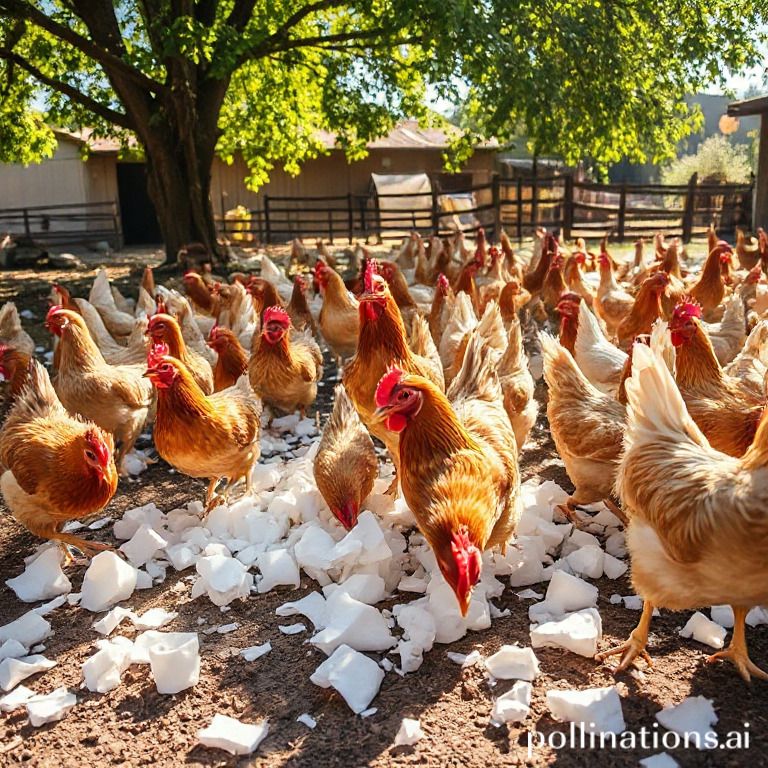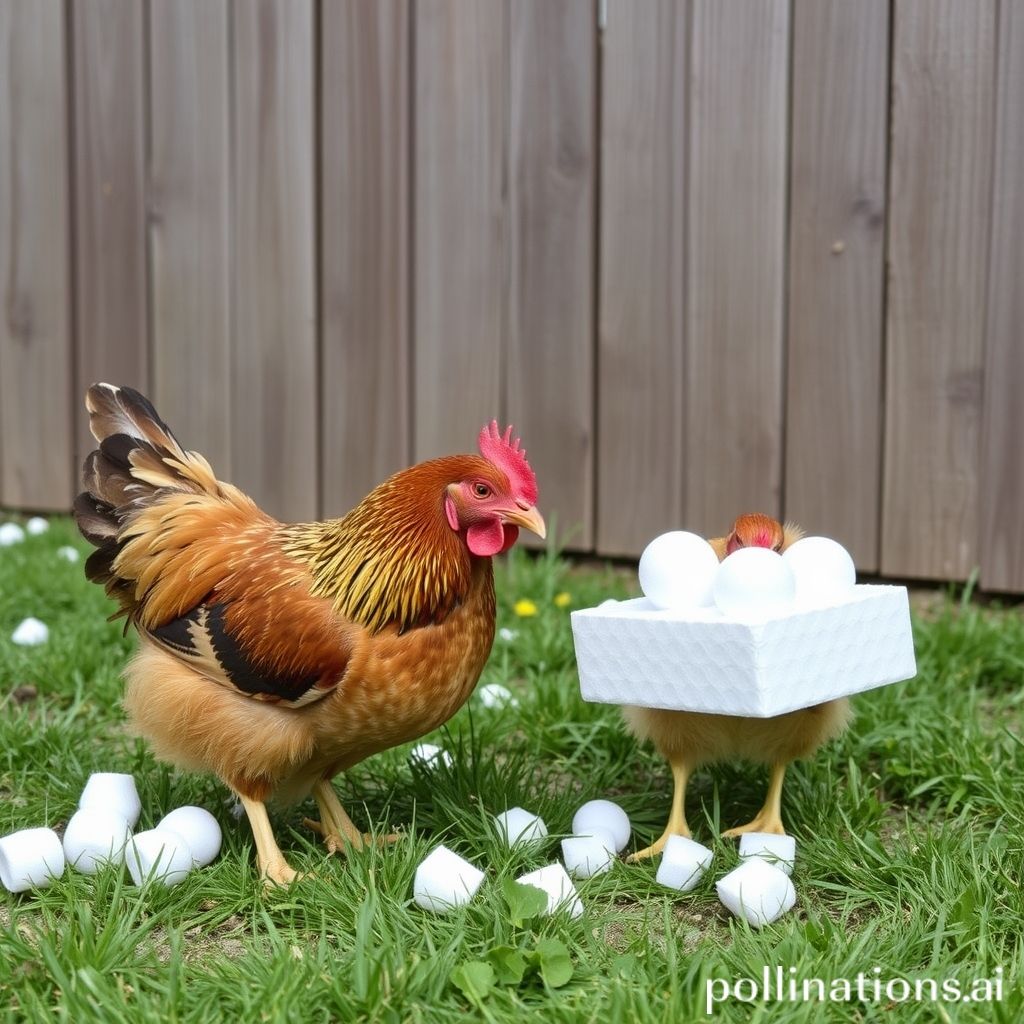Why do chickens eat Styrofoam? This is a question that has puzzled many chicken owners and enthusiasts. It seems strange that these birds would consume something as unnatural as Styrofoam, but the truth is, chickens have a unique way of finding their food.
Chickens are natural foragers, constantly pecking at the ground in search of insects, seeds, and anything else that catches their fancy. Insects, in particular, are a favorite snack for chickens, and sometimes, they mistake Styrofoam for a tasty morsel. But why? Is it harmful for them? In this article, we will delve into the reasons behind this behavior and address any concerns you may have about the potential consequences. So, let’s dive in and explore why chickens eat Styrofoam.
Longer Chain Chicken Toys for Coop Accessories
Reasons why chickens eat Styrofoam
It may be puzzling to see chickens eating Styrofoam, but there are several reasons that can explain this behavior.
1. Instinctual behavior and curiosity
Chickens have a natural instinct to peck at objects they encounter, especially if they are unfamiliar. This behavior comes from their desire to explore their surroundings and search for food. Styrofoam, with its texture and appearance, can catch their attention and spark their curiosity.
In addition, chickens are opportunistic eaters and may peck at various materials in their environment. Since Styrofoam is lightweight and easily accessible, chickens may mistake it for food and consume it.
2. Nutritional deficiencies in chickens
Another reason chickens may eat Styrofoam is because they lack certain nutrients in their diet. Chickens need a balanced diet to meet their nutritional needs, and a lack of specific nutrients can lead to unusual eating behaviors.
Some researchers suggest that chickens eating Styrofoam may be trying to compensate for these nutritional deficiencies by ingesting non-nutritive materials. This behavior, known as pica, is observed in various animals and can indicate inadequate nutrition.
3. Lack of proper environmental enrichment
Chickens require environmental enrichment to fulfill their natural behaviors and prevent boredom. When chickens are kept in confined spaces without enough stimulation, they may resort to destructive behaviors, such as pecking at objects like Styrofoam.
Providing appropriate environmental enrichment, such as perches, dust baths, and objects to peck at, can help reduce the likelihood of chickens resorting to eating Styrofoam. Ensuring a stimulating environment allows chickens to engage in natural behaviors and decreases the risk of them consuming non-edible materials.

Potential Hazards of Chickens Consuming Styrofoam
1. Health Problems Caused by Eating Styrofoam
When chickens ingest Styrofoam, it can pose various health risks. Styrofoam cannot be digested and may cause blockages in their digestive system. This can result in several health issues, including:
- Intestinal Blockage: The Styrofoam obstructs the passage of food through the chicken’s digestive tract, which can cause discomfort, pain, and potentially be fatal if left untreated.
- Nutritional Deficiencies: Chickens may feel full after consuming Styrofoam, but they don’t receive the necessary nutrients from their regular feed. Over time, this can lead to malnutrition and weaken their immune system.
- Choking Risk: Small pieces of Styrofoam can break off and become stuck in the chicken’s throat, leading to choking. Immediate intervention is crucial to prevent a life-threatening situation.
2. Impact on Chicken’s Digestive System
The chicken’s digestive system is not adapted to break down Styrofoam, which is composed of non-biodegradable materials. Consequently, ingested Styrofoam accumulates in their digestive tract, causing:
- Slow Digestion: Styrofoam can slow down the digestion process, resulting in discomfort and potential digestive issues like bloating and constipation.
- Impaired Nutrient Absorption: The presence of Styrofoam in the digestive system can interfere with nutrient absorption, reducing the chicken’s ability to extract essential vitamins and minerals from their food.
- Increased Risk of Infection: The accumulation of Styrofoam creates an environment favorable for harmful bacteria to thrive, increasing the risk of bacterial infections in the chicken’s digestive system.
3. Potential Harm to the Chicken’s Overall Well-being
Aside from the immediate health concerns, chickens that consume Styrofoam may experience long-term consequences on their overall well-being:
- Behavioral Changes: Regular consumption of Styrofoam can alter a chicken’s behavior, making them more prone to abnormal eating habits and reducing their interest in nutritious food.
- Reduced Egg Production: Nutritional deficiencies caused by Styrofoam consumption can impact the chicken’s reproductive system, resulting in decreased egg production or low-quality eggs.
- Higher Mortality Rates: If left unaddressed, the health issues associated with Styrofoam consumption can lead to increased mortality rates among chickens.
It is crucial to take preventive measures to ensure that chickens do not have access to Styrofoam. Providing a healthy and balanced diet, along with appropriate environmental enrichment, can help discourage this potentially harmful behavior.
How to stop chickens from consuming Styrofoam
Chickens have a natural tendency to peck at various objects in their surroundings, including Styrofoam. This behavior can be harmful to their health. To prevent them from eating Styrofoam, try the following measures:
1. Providing alternative sources of entertainment
Chickens may peck at Styrofoam out of boredom. To redirect their attention, offer alternative sources of entertainment. Consider the following:
- Foraging activities: Spread treats or grains around the coop or run to encourage natural foraging behavior.
- Chicken toys: Use toys made specifically for chickens, like hanging treat dispensers or puzzle feeders.
- Dust baths: Create a designated area for chickens to take dust baths, which satisfies their natural instincts.
2. Ensuring a well-balanced diet for chickens
If chickens lack essential nutrients, they may be more inclined to eat Styrofoam. Provide a well-balanced feed that meets their nutritional needs. Consult with a poultry nutritionist or veterinarian for suitable feed options. Additionally, consider the following:
- Supplemental greens: Offer a variety of fresh greens, like lettuce or kale, to provide additional nutrients and keep chickens occupied.
- Grit: Provide poultry grit, which aids digestion and reduces the likelihood of chickens seeking alternative substances to peck at.
3. Removing or securing any Styrofoam in the chicken’s environment
To effectively prevent chickens from eating Styrofoam, eliminate their access to it. Take the following steps:
- Remove loose Styrofoam: Thoroughly inspect the chicken’s environment and remove any loose or easily accessible Styrofoam.
- Secure objects: Use chicken-safe materials, like wood or metal, to secure objects that contain Styrofoam, such as insulation boards or packaging materials.

Steps to follow if chickens have already ingested Styrofoam
1. Observing the chicken’s behavior and health
After discovering that your chickens have consumed Styrofoam, it is important to closely watch their behavior and monitor their health. Look for any signs of distress or discomfort, such as difficulty breathing, lack of energy, or changes in appetite.
2. Seeking advice from a veterinarian
Consulting a veterinarian is crucial to ensure the well-being of your chickens. They can provide expert guidance on the best actions to take based on the specific situation. The veterinarian may recommend certain treatments or interventions to help your chickens safely pass the ingested Styrofoam.
3. Taking preventative measures to avoid further ingestion
Preventing chickens from consuming more Styrofoam is important to avoid potential health risks. Consider the following measures:
- Remove any remaining Styrofoam: Thoroughly check the chicken’s surroundings and eliminate any accessible Styrofoam that they may come into contact with.
- Provide alternative materials for pecking: Chickens may have a natural instinct to peck at objects. Offer them safe and appropriate materials, such as toys or natural materials like wood, to redirect their pecking behavior.
- Ensure a balanced diet: Make sure that your chickens are receiving a well-balanced and nutritious diet to minimize the chances of them seeking out Styrofoam or other non-food items.
Informing chicken keepers about chicken behavior
Chicken keepers should be aware of the various behaviors exhibited by their flock, including unusual eating habits. One behavior that may confuse chicken keepers is the consumption of Styrofoam. In this section, we will explore the reasons why chickens eat Styrofoam and discuss the potential dangers associated with this behavior.
1. Raising awareness about the potential risks
During it may seem harmless for chickens to nibble on Styrofoam, there are significant risks involved. Styrofoam is not suitable for consumption and can cause serious health issues for chickens. When chickens ingest it, it can block their digestive system, resulting in intestinal obstructions and even death. It is crucial for chicken keepers to be aware of these dangers and take necessary precautions to prevent their flock from accessing Styrofoam.
2. Sharing experiences and tips from other chicken keepers
Many chicken keepers have encountered this behavior in their flocks and have valuable insights to share. By learning from the experiences of others, new chicken keepers can gain a better Grasping of why chickens are attracted to Styrofoam and how to address this issue. Additionally, experienced chicken keepers can provide tips on how to prevent chickens from consuming Styrofoam and suggest alternative materials that can be used for enrichment.
3. Promoting responsible ownership and care for chickens
As responsible chicken keepers, it is our duty to ensure the well-being of our feathered friends. By educating ourselves about their behaviors, we can provide a safe and stimulating environment for them to thrive. Grasping why chickens eat Styrofoam allows us to take proactive measures to prevent this behavior and protect our chickens from potential harm. It is essential to promote responsible ownership and care, which includes providing appropriate nutrition and engaging activities to keep chickens away from harmful substances like Styrofoam.
Conclusion
It is crucial to be aware of the dangers associated with chickens eating Styrofoam. The ingestion of this material can lead to serious health issues and even death in poultry.
By Embracing the reasons behind this behavior and taking preventive measures such as providing a well-balanced diet and safe environment, chicken owners can protect the well-being of their flock. It is our responsibility to prioritize the health and safety of our chickens by ensuring they are not exposed to Styrofoam or any other harmful substances. Let’s take the necessary steps to keep our chickens healthy and thriving.
FAQ about Chickens Eating Styrofoam
FAQ 1: Can chickens die from eating Styrofoam?
Yes, chickens can potentially die from eating Styrofoam. Styrofoam is not digestible and can cause blockages in their digestive system, leading to serious health issues or even death. It is important to keep Styrofoam away from chickens to ensure their well-being.FAQ 2: Is it safe to use Styrofoam in chicken coops?
No, it is not safe to use Styrofoam in chicken coops. Chickens may peck at or consume Styrofoam, which can be harmful to their health. It is recommended to use alternative materials that are safe and non-toxic for chicken coops.FAQ 3: How can I provide environmental enrichment for my chickens?
To provide environmental enrichment for chickens, you can: 1. Provide perches and roosting bars for them to climb and perch on. 2. Offer a variety of toys, such as hanging treats or pecking balls. 3. Create a dust bath area for them to engage in natural behaviors. 4. Allow access to outdoor areas where they can forage and explore. 5. Provide objects for pecking and scratching, like logs or branches.FAQ 4: Are there any alternative materials to Styrofoam for chicken’s entertainment?
Yes, there are alternative materials that can be used for chicken’s entertainment. Some options include: 1. Natural materials like wood blocks or branches for pecking. 2. Hanging treats or vegetable feeders to encourage natural foraging behavior. 3. Puzzle feeders or treat balls to provide mental stimulation. 4. Swings or perches for chickens to climb and play on.FAQ 5: What other unusual items might chickens eat?
Chickens may eat a variety of unusual items, including: 1. Small stones or pebbles for digestion and grit. 2. Insects or worms they find During foraging. 3. Small amounts of grass or vegetation. 4. Small scraps of fruits or vegetables. 5. Feathers or eggshells for added calcium. Remember to provide a balanced and appropriate diet for chickens to ensure their overall health and well-being.Read Similar Post:
1. How Often Do Chickens Need Grit?
2. What Are Heritage Breed Chickens?

